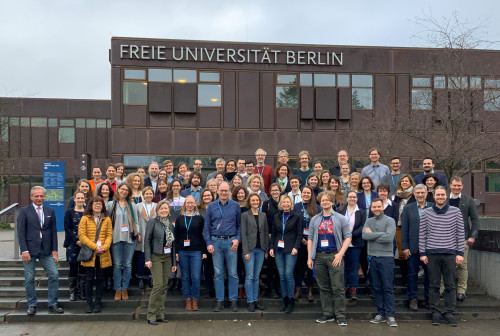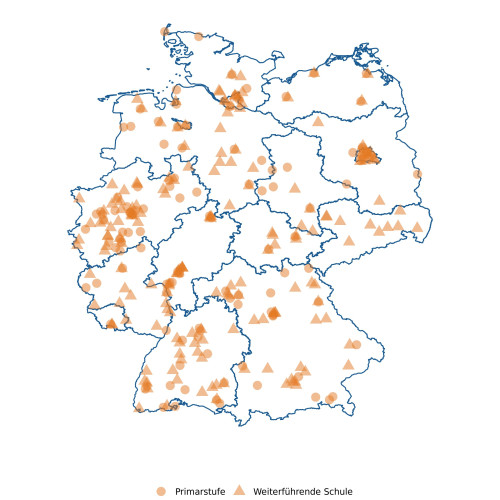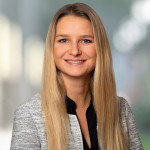‘Leistung macht Schule’ (Promoting Excellence in School Education) is a research and school development project funded by the German Federal Ministry of Education and Research to promote high-achieving and particularly capable learners. The project is embedded in a ten-year joint initiative of the Federal Government and the German federal states (Länder). The interdisciplinary research network LemaS (‘Leistung macht Schule’ – ‘Talent development and performance in school education’), which consists of 18 universities, is responsible for the scientific design and overall coordination of the research and development programme of the first funding phase (2018-June 2023). The programme is implemented in 22 sub-projects that cooperate with a total of 300 schools selected from all school types involved in primary and secondary education in Germany. The overall goal is the theory- and evidence-based optimisation of a school and classroom design that promotes talent and performance achievement through close cooperation between science and school practice. Strategies, concepts, measures and materials are developed, tested and evaluated in the two core modules ‘Development of a School Mission Statement with a Focus on Performance-Promoting School Development and the Establishment of a Cooperative Network Structure’ (Core Module 1) and ‘Challenge and Support in Regular Classrooms’ (Core Module 2).

The Research Network LemaS (‘Promoting Excellence in School Education’)
The interdisciplinary research network ‘Leistung macht Schule’ (LemaS) develops and tests science-based concepts for the best possible support of (potentially) high-achieving pupils in 22 sub-projects with school administrators and teachers at 300 schools across Germany. LemaS brings together 28 leading researchers from 18 universities from the fields of educational science, empirical educational research, educational psychology and subject didactics (German, English, STEM subjects). The research network bundles broad and long-standing scientific expertise in the field of talent and performance promotion in school contexts, in particular with regard to the individual promotion of high performance potential as well as school development and network building. The research conducted is insight- and application-oriented, and the development of materials, strategies and measures for the promotion of talent and performance in schools and classrooms takes a practice-oriented and evidence-based approach. At the centre of the project strategy is the sustainable networking of science and practice: intensive exchange, reflection and an adaptive approach lead to LemaS products (i.e. concepts, strategies, measures and materials) under scientific support and monitoring at the schools, which can be disseminated across the German school landscape after the conclusion of the first funding phase. The aim of the project ‘Leistung macht Schule’ (‘Talent development and performance in school education’) is to achieve a change in attitudes towards talent, performance and performance promotion: A potential-oriented view of learners is fundamental, and potentials and strengths are understood as elements of diversity. Of central importance is the reconceptualisation of performance, which includes the formation of personality and the life context of the pupils and is the basis for the further development and change of school and teaching. The 22 sub-projects are each implemented independently by research teams consisting of project managers and academic staff at the participating universities. The 10-member managing committee headed by the coordinator, Professor Gabriele Weigand (University of Education Karlsruhe), is responsible for the development, implementation and consolidation of the complex work programme in the research network.
B) The Joint Federal and State Initiative ‘Leistung macht Schule (‘Talent development and performance in school education’): Background and Project Structure
As international comparative studies in education have shown in recent years, high-achieving and particularly capable pupils in Germany are not fully exploiting their potentials. The joint federal and state initiative ‘Leistung macht Schule’ (‘Promoting Excellence in School Education’), which was adopted in November 2016, intends to optimise the development opportunities of these children and young people. The joint project ‘Leistung macht Schule’ (LemaS), which is scheduled to run for a total of 10 years and will be implemented in two funding phases, aims to promote high-achieving and particularly capable learners. Based on the principle that the development of potentials and the promotion of performance for all pupils is a self-evident task of every school, ‘Leistung macht Schule’ promotes a broad-based school development process with practical scientific support and monitoring. Special attention is paid to pupils from less educationally advantaged homes and those from migrant families. In addition, the project also focuses on gender balance, especially with regard to girls in the STEM subjects. The first phase of the project (2018-June 2023) deals with the (further) development of materials, concepts and measures for the promotion of (potentially) high-performing pupils in a total of four modules: • Core Module 1: Development of a School Mission Statement with a Focus on Performance-Promoting School Development and Establishment of a Cooperative Network Structure • Core Module 2: Challenge and Support in Regular Classrooms • Optional Module 3: Diagnosis and Counselling • Optional Module 4: Challenge and Support beyond Regular Classrooms
The second phase (July 2023-2027) aims at the transfer and dissemination of the results gained on a broad scale, with the participating schools of the first phase acting as multipliers for other schools. The funding of the initiative ‘Leistung macht Schule’ (‘Talent development and performance in school education’) is shared equally by the German Federal Ministry of Education and Research and the federal states and is supported with a total of 125 million euros.


The 300 LemaS Project Schools
The programme of ‘Leistung macht Schule’ (‘Promoting Excellence in School Education’) is structured across all types of schools; it integrates schools from primary and secondary education including the transitions. In principle, LemaS focuses on all pupils from the first year onwards – regardless of their age, sex and origin. Through the work in the 22 sub-projects, potential-oriented and performance-promoting school cultures as well as differentiated diagnostics and equally differentiated support measures are to be established at the LemaS project schools in order to promote special potentials and performance strengths of children and young people as broadly as possible, but also at the top. A total of 300 schools are participating in the ‘Leistung macht Schule’ project. The schools were selected by the individual federal states in their own procedures. Selection criteria included regional balance, participation of all state-specific school types and a balance of schools with previous experience and those with little previous experience in the field of the development and promotion of giftedness and talented pupils. Schools with a high percentage of migrant and socially disadvantaged pupils were also involved. Each school participates in a sub-project from Core Module 2 with a focus on curriculum development. In addition, about half of the schools participate in one of the three sub-projects from Core Module 1 ‘School Development’. In this way, nationwide groupings of schools have emerged in the 22 sub-projects. The cooperation with the schools started in mid-2018. The interactive map shows the distribution of the schools in Germany and their allocation to the 22 sub-projects. The filter function in the top right-hand corner of the map can be used to select the sub-projects whose schools are to be displayed.
All 300 LemaS schools
The LemaS Sub-Projects
The LemaS research network has a modular structure and consists of 22 sub-projects on the theory- and evidence-based optimisation of the promotion of high-performing and particularly capable learners in schools and classrooms. These 22 sub-projects are allocated to two core modules. In cooperation with the schools, core module 1 (sub-projects 1 to 3) deals with the development of mission statements which, by agreeing on common values and goals, include a school culture that promotes talent and performance and the establishment of cooperative network structures. Furthermore, core module 1 is concerned with the transitions between pre-school and primary education as well as primary and secondary education with a focus on STEM. Core module 2 (sub-projects 4 to 22) focuses on teaching: Again in close cooperation with the schools, it is about the evidence-based development of LemaS products, i.e. strategies, concepts, measures and materials, for the diagnosis-based individual support across all subjects as well as subject-specific with a focus on STEM and languages (German and English), which contribute to (potentially) high-performing pupils being better supported and more strongly challenged. The 22 sub-projects are each implemented independently by research teams at the participating universities. Depending on the goals and contents of the sub-projects, the researchers cooperate with the school LemaS teams, the school administrators or the entire teaching staff in various ways: in workshops, via digital formats or on site in the schools. Sometimes the entire school community, pupils, parents and other stakeholders, including representatives of ministries or state institutes for teacher training and school development (or similar institutions) should also be involved.
Core Module 2
Adaptive formats of the promotion of linguistic-aesthetic conversation in German lessons at primary schools
Different adaptive concepts for diversity-sensitive learning will be developed with a focus on the promotion of linguistic-aesthetic conversation in German lessons at primary schools.

Prof. Dr. Johannes Mayer
Goethe-Universität Frankfurt
Core Module 2
Adaptive formats of the promotion of linguistic-literary competences: linguistic-rhetorical communication/argumentation
Different adaptive concepts for diversity-sensitive learning will be developed with a focus on the promotion of linguistic-rhetorical communication/argumentation in lower secondary education

Prof. Dr. Carmen Spiegel
Pädagogische Hochschule Karlsruhe
Core Module 2
Diversity-sensitive learning with complex tasks in Teaching English as a Foreign Language
This sub-project is concerned with the development, testing and evaluation of complex competence tasks for high-achieving and particularly capable pupils in the first foreign language in lower and upper secondary education, taking into account diversity factors in the learning groups.

Prof. Dr. Wolfgang Hallet
Justus-Liebig-Universität Gießen
Core Module 2
Personalised development plans as an instrument of individual talent promotion: Sustainable design of performance-promoting teaching-learning settings in grammar school education (called “Gymnasium” in German)
This sub-project is about the design of teaching-learning settings in grammar school education by means of personalised development plans and about supporting teachers in the individual promotion of high-performing and particularly capable pupils in the classroom.

Prof. Dr. Heinz-Werner Wollersheim
Universität Leipzig
Core Module 2
Searching for and identifying performance potentials: A project for the material-based promotion of the diagnostic competences of primary school teachers
The aim is to promote the diagnostic competences of primary school teachers in the subjects of mathematics and science education, with special attention to high-performing and particularly capable pupils.

Prof. Dr. Franzis Preckel
Universität Trier
Contact us

Koordinatorin des Forschungsverbund & Projektleitende
Prof. Dr. Gabriele Weigand
gabriele.weigand@ph-karlsruhe.de